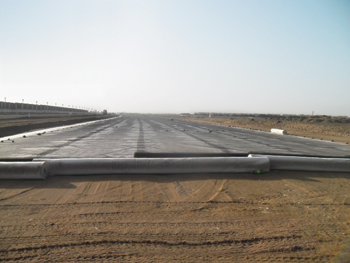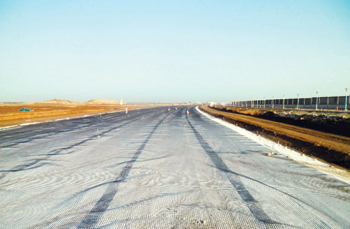Alyaf leads region in geosynthetics
01 February 2015
Alyaf Industrial Company’s Alfgrid geocomposite layer combines the functions of geotextiles and geogrids thus reinforcing and stabilising unstable sabkha soils.
ALYAF Industrial Company of Saudi Arabia, which is considered to be the largest manufacturer of geosynthetic products in the Middle East, says it continues to be the leader in delivering ‘value-engineering’ solutions for civil and environmental engineering applications, particularly site-specific soil stabilisation solutions for weak “sabkha” soils in the region.
Sabkha soils are composed of sediments that are unconsolidated and are characterised by high salinity and low load-bearing capacity. Due to the hot and arid climate in the region, these soils are exposed to low precipitation and excessive evaporation that results in saline water rising into the upper layers through capillary action, says Khalid Meccai, technical support and export sales manager.
“Their susceptibility to collapse due to flooding or wetting, as well as their acute water sensitivity pose serious concerns in the construction of railway lines and roads, in particular,” he says.
Meccai points out that the traditional solution of soil replacement – whilst being expensive – is virtually impractical in most cases because of the difficulty of access and trafficability of construction equipment on sabkha soils.
Alyaf has successfully supplied more than 500 million sq m of geosynthetic products over the past two decades, and has cemented its position by continually improving its product range, he says.
Alyaf offers site-specific geosynthetics solutions for improving sabkha soils that abound in the Middle East and employs a specially engineered geocomposite in place of the traditional solution.
He continues: “The novel solution involves the use of an Alfgrid geocomposite layer directly over the sabkha soil and overlaying it with an open graded aggregate layer.
“Alfgrid combines the functions of geotextiles and geogrids, therefore, providing multiple functions of separation, filtration and reinforcement.
“The aggregate layer may be directly laid on the Alfgrid and the area immediately becomes a working platform, providing both access and trafficability of construction equipment.”
 |
|
Alfgrid geocomposite layer being laid at Kaust. |
The open graded aggregate layer, in addition to structural support, provides a much-needed system to break the capillary action and mitigate the rise of saline ground water into the base course layers of the pavement.
“This is critical because sabkha soils are known for their high salinity levels, which could be four to six times that of seawater from the same vicinity. This can be drawn into the structural layers of the pavement by capillary action and can recrystallise therein, causing expansion and blistering at the surface. The integrity and functionality of the open graded aggregate layer is protected by placing a polyester geotextile over it as a filter layer,” Meccai elaborates.
Sabkha soils are highly variable and hence the design and selection of the geosynthetics has to follow site-specific needs, he adds.
Alyaf’s technical support team works closely with clients and geotechnical designers and has successfully provided site-specific soil improvement solutions for millions of square metres.
Some of its key projects include the soil improvement works at King Abdullah University of Science and Technology (Kaust), Saudi Aramco’s Wasit Gas project, North-South Railway with a Louis Berger-led consortium, and King Abdul Aziz Road in Thuwal, all in Saudi Arabia; Sheikh Khalifa bin Salman Highway in Bahrain with Parsons Global; and others.
As part of its culture of innovation, Alyaf has been at the forefront of the geosynthetics revolution, providing a diverse range of high-performance geotextiles, geocomposites, geogrids, and geosynthetic clay liners (GCLs).
As the first and largest manufacturer of high-grade polyester or polypropylene geotextiles, it has delivered solutions for several civil and environmental engineering applications, says Meccai.
Besides Alfgrid for soil stabilisation, its diverse product portfolio also includes the Alfweb three-dimensional cellular confinement system for slope protection; Alfdrain geocomposite drainage and gas venting systems; and Alfgeo green roof systems, salt barriers and capillary break layers.
In a bid to better respond to the increasing market need for quality geosynthetic products, Alyaf has established a joint venture with the UK-based Geofabrics to manufacture a new range of high-quality geocomposites at its production facility in Dammam.
- Alyaf leads region in geosynthetics
- Sumitomo restyles paver for the world
- New Cat pavers boost performance, economy
- Vogele proves mettle in historic Antalya
- Pozzolan aims high in plastic spacers export
- Bentley goes in-depth with road designing
- Trimble upgrades roads software



